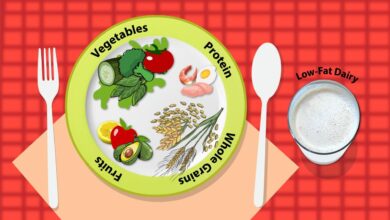
The Many Health Benefits of Eating Grapefruit
The many health benefits of eating grapefruit are a testament to the power of nature. This vibrant citrus fruit is not only a delicious addition to your diet but also a nutritional powerhouse packed with vitamins, minerals, and antioxidants that can positively impact your overall well-being.
From boosting your immune system to aiding in weight management, grapefruit offers a range of advantages that can help you live a healthier and happier life.
Grapefruit’s versatility makes it a perfect addition to various meals and snacks. You can enjoy it fresh, juiced, or incorporated into salads, smoothies, and desserts. Its tart and tangy flavor adds a refreshing twist to any dish, making it a delightful treat for your taste buds while providing numerous health benefits.
Nutritional Powerhouse
Grapefruit, a refreshing and tangy citrus fruit, is not only delicious but also a nutritional powerhouse packed with essential vitamins, minerals, and antioxidants. Its vibrant pink or yellow flesh offers a range of health benefits that can contribute to overall well-being.
Vitamin C Content
Grapefruit is an excellent source of vitamin C, a powerful antioxidant that plays a crucial role in immune function, collagen synthesis, and wound healing. A single medium-sized grapefruit provides about 64 mg of vitamin C, which is approximately 71% of the recommended daily intake for adults.
- Orange:70 mg per medium fruit
- Lemon:29 mg per medium fruit
- Lime:20 mg per medium fruit
Antioxidant Properties
Antioxidants are compounds that protect the body from damage caused by free radicals, unstable molecules that can damage cells and contribute to chronic diseases. Grapefruit is rich in antioxidants, including flavonoids, carotenoids, and vitamin C, which work together to neutralize free radicals and reduce oxidative stress.
“Antioxidants help to protect cells from damage caused by free radicals, which can contribute to aging and chronic diseases.”
Weight Management
Grapefruit, a tangy and refreshing citrus fruit, has gained popularity as a potential aid in weight management. Its unique combination of nutrients and properties may contribute to weight loss by boosting metabolism, promoting satiety, and potentially reducing calorie intake.
Grapefruit is a nutritional powerhouse, packed with vitamins, antioxidants, and fiber. It’s known to boost metabolism, aid digestion, and even help manage blood sugar levels. Speaking of transformations, have you heard about how a vacation helped Charlotte lose half her body weight?
Read her story here. Just like a vacation can refresh your mind and body, grapefruit can do wonders for your health, too. So, why not add this juicy citrus fruit to your daily routine?
Grapefruit’s Impact on Metabolism
Grapefruit contains compounds that may stimulate metabolism, the process by which your body burns calories for energy. One such compound is naringenin, a flavonoid found in grapefruit, which has been shown to increase the rate at which your body burns fat.
A study published in the Journal of Agricultural and Food Chemistry found that naringenin significantly increased the expression of genes involved in fat metabolism in mice. While more research is needed to confirm these effects in humans, these findings suggest that grapefruit may play a role in boosting metabolism and aiding weight loss.
Grapefruit is a nutritional powerhouse, packed with vitamin C, antioxidants, and fiber, making it a great addition to a healthy diet. But let’s be honest, sometimes you crave a slice of pizza! If you’re looking for a guilt-free way to satisfy those cravings, check out 11 healthy pizzas under 400 calories.
After your pizza fix, don’t forget to squeeze in some grapefruit for an extra boost of vitamins and a refreshing taste.
Grapefruit’s Role in Satiety
Grapefruit is a low-calorie fruit that is high in fiber. Fiber adds bulk to your diet, making you feel fuller for longer and reducing overall calorie intake. The high water content in grapefruit also contributes to feelings of fullness, helping you eat less.
Incorporating Grapefruit into a Healthy Diet
Grapefruit can be easily incorporated into a healthy diet for weight management. Here are some ways to enjoy this tangy fruit:
- Start your day with a grapefruit half for breakfast. Its refreshing taste and high vitamin C content can energize your morning.
- Add grapefruit slices to salads for a burst of flavor and a dose of nutrients.
- Enjoy grapefruit juice as a healthy alternative to sugary beverages. Remember to choose unsweetened varieties.
- Use grapefruit in smoothies for a refreshing and nutritious treat.
Research on Grapefruit and Weight Management, The many health benefits of eating grapefruit
While research on the direct impact of grapefruit consumption on weight loss is ongoing, some studies have shown promising results. A study published in the International Journal of Obesity found that consuming grapefruit before meals led to a significant reduction in body weight and body mass index (BMI) in overweight individuals.
Another study published in the Journal of Nutrition found that grapefruit consumption was associated with a decrease in waist circumference and a reduction in total body fat.
It’s important to note that grapefruit’s potential weight management benefits are likely part of a broader healthy lifestyle that includes a balanced diet, regular exercise, and sufficient sleep.
Heart Health Benefits

Grapefruit, with its vibrant color and tangy flavor, is not just a delicious addition to your diet but also a potential ally in safeguarding your heart health. Studies have shown that grapefruit consumption may play a role in lowering cholesterol levels and reducing the risk of heart disease.
Lowering Cholesterol Levels
Cholesterol is a waxy substance found in your blood that is essential for building healthy cells. However, high levels of LDL cholesterol, often referred to as “bad” cholesterol, can accumulate in your arteries and lead to heart disease. Grapefruit contains compounds that may help lower cholesterol levels.
- Pectin:This soluble fiber found in grapefruit can bind to cholesterol in the digestive tract, preventing its absorption into the bloodstream. This can lead to a reduction in LDL cholesterol levels.
- Naringenin:This flavonoid, abundant in grapefruit, has been shown to inhibit the production of cholesterol in the liver. This can further contribute to lowering LDL cholesterol levels.
Digestive Health

Grapefruit, with its refreshing tang and vibrant color, is not only a delicious addition to your diet but also a boon for your digestive system. Its high fiber content and other beneficial compounds can promote regularity, reduce constipation, and contribute to overall gut health.
Fiber’s Role in Digestive Health
Dietary fiber is an essential component of a healthy digestive system. It is a type of carbohydrate that our bodies cannot digest, but it plays a crucial role in maintaining gut health. Fiber adds bulk to stool, making it easier to pass through the digestive tract and preventing constipation.
- Increases Stool Frequency:Fiber absorbs water in the gut, adding bulk to stool and making it easier to pass. This can help regulate bowel movements and prevent constipation.
- Promotes Regularity:By increasing stool frequency, fiber helps maintain a regular bowel movement schedule, ensuring efficient waste elimination from the body.
- Prevents Constipation:When stool moves slowly through the digestive tract, it can become hard and difficult to pass, leading to constipation. Fiber helps prevent this by adding bulk and promoting regular bowel movements.
Incorporating Grapefruit for Digestive Health
Here are some tips to incorporate grapefruit into your diet for optimal digestive health:
- Eat Grapefruit with Meals:Enjoy a grapefruit segment or half a grapefruit as a refreshing addition to your breakfast or lunch. This helps promote digestive regularity and prevents constipation.
- Add Grapefruit to Salads:Grapefruit’s tangy flavor adds a burst of freshness to salads. Its high fiber content also contributes to digestive health.
- Make a Grapefruit Smoothie:Blend grapefruit with other fruits, vegetables, and yogurt for a delicious and nutritious smoothie that supports digestive health.
Immune System Support: The Many Health Benefits Of Eating Grapefruit
Grapefruit’s impressive nutritional profile extends beyond its contributions to weight management and heart health. It also plays a crucial role in bolstering the immune system, helping your body fight off infections and maintain overall well-being.
Grapefruit is a powerhouse of nutrients, offering a boost of vitamin C, antioxidants, and fiber. It’s a delicious and refreshing way to start your day, but if you’re looking to diversify your veggie intake, check out these 5 ways to up your vegetable game.
While grapefruit is a great choice, incorporating a variety of vegetables into your diet ensures you get a wide range of vitamins and minerals, which is essential for overall health and well-being.
Vitamin C’s Role in Immune Function
Vitamin C is a powerful antioxidant that plays a vital role in immune system function. Grapefruit is an excellent source of this essential nutrient, providing a significant portion of your daily recommended intake in just one serving. Vitamin C supports the production of white blood cells, which are the body’s primary defense against infections.
These cells act as soldiers, identifying and destroying harmful pathogens like bacteria, viruses, and parasites.
Antioxidants and Immune System Strengthening
Grapefruit is packed with antioxidants, which are compounds that protect cells from damage caused by free radicals. Free radicals are unstable molecules that can damage cells and contribute to chronic diseases. Antioxidants help neutralize these harmful molecules, reducing oxidative stress and promoting overall health.
A robust immune system is essential for fighting off infections, and antioxidants play a key role in maintaining this strength.
Incorporating Grapefruit into a Healthy Diet for Immune Support
Grapefruit can be easily incorporated into your daily diet to boost your immune system. Here are some delicious and healthy ways to enjoy this citrus fruit:
- Start your day with a grapefruit breakfast:Enjoy a slice of grapefruit with your breakfast or add it to a smoothie for a refreshing and vitamin-rich start to your day.
- Add grapefruit to salads:The tangy flavor of grapefruit complements a variety of salads, adding a burst of flavor and a dose of vitamin C.
- Make a grapefruit juice:Freshly squeezed grapefruit juice is a healthy and delicious way to get your daily dose of vitamin C. You can also add it to other juices for a refreshing blend.
- Enjoy grapefruit in desserts:Grapefruit can be incorporated into desserts, such as fruit salads, yogurt parfaits, or even baked goods, adding a touch of sweetness and a boost of nutrients.
Skin Health Benefits
Grapefruit is not only a delicious and refreshing fruit but also a powerhouse of nutrients that can benefit your skin. Its antioxidant and collagen-boosting properties make it a natural ally for healthy and radiant skin.
The Role of Antioxidants in Skin Health
Antioxidants are essential for protecting your skin from damage caused by free radicals, which are unstable molecules that can damage cells and contribute to premature aging. Grapefruit is rich in antioxidants, including vitamin C, which helps neutralize free radicals and protect your skin from sun damage.
Grapefruit’s Collagen-Boosting Properties
Collagen is a protein that provides structure and elasticity to your skin. As we age, collagen production naturally declines, leading to wrinkles and sagging skin. Grapefruit is a good source of vitamin C, which is crucial for collagen synthesis.
Grapefruit Juice for Skin Health
Drinking grapefruit juice can provide your skin with a boost of antioxidants and vitamin C. However, it’s important to note that grapefruit juice can interact with certain medications, so it’s always best to consult with your doctor before adding it to your diet.
Using Grapefruit in Your Skincare Routine
Grapefruit can be incorporated into your skincare routine in several ways:
- Grapefruit Mask:Mash a grapefruit and apply it to your face as a mask. Leave it on for 15-20 minutes before rinsing it off. This mask can help brighten your skin and reduce blemishes.
- Grapefruit Toner:Mix grapefruit juice with water and use it as a toner after cleansing. This can help balance your skin’s pH and tighten pores.
- Grapefruit Scrub:Combine grapefruit zest with sugar or oatmeal to create a gentle exfoliating scrub. This can help remove dead skin cells and reveal brighter skin.
Final Wrap-Up
Incorporating grapefruit into your diet can be a simple yet powerful step towards improving your health and well-being. Its nutritional profile, rich in antioxidants and essential vitamins, offers a range of benefits, from promoting heart health and aiding digestion to boosting immunity and supporting skin health.
Whether you enjoy it fresh, juiced, or as part of a meal, grapefruit is a delicious and healthy choice that can contribute to a vibrant and fulfilling life.






